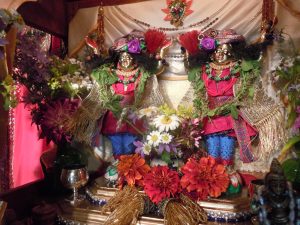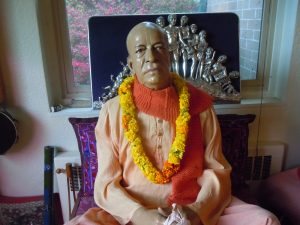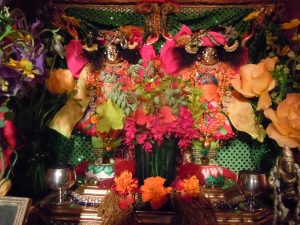Hare Krsna-below we have 4 verses and purports in which Srila Prabhupada
kindly explains the differences between conditioned souls, third class devotees who are liberated and what it takes to perform. pure devotional service. One may find these words valuable.
It is interesting to note that Tapana Misra and Chandrasekhara (Associates of Caitanya Mahaprabhu who would eat at their homes) were categorized as kanistha adhikari because their knowledge of sastra was not sufficient to defeat the mayavadi philosophers in Benares . However because of their great love for Mahaprabhu they could not tolerate the insults of the mayavadis.
So one can have great love for the Lord but because of deficient sastric knowledge is put in the category of third class devotee, kanistha adhikaris.
Therefore Srila Prabhupada says even the third class devotees are liberated souls or become imperceptibly liberated.
Hare Krsna
damaghosa das
SB 3.25.36–Upon seeing the charming forms of the Lord, smiling and attractive, and hearing His very pleasing words, the pure devotee almost loses all other consciousness. His senses are freed from all other engagements, and he becomes absorbed in devotional service. Thus in spite of his unwillingness, he attains liberation without separate endeavor.
PURPORT–There are three divisions of devotees—first-class, second-class and third-class. Even the third-class devotees are liberated souls.It is explained in this verse that although they do not have knowledge, simply by seeing the beautiful decoration of the Deity in the temple,the devotee is absorbed in thought of Him and loses all other consciousness. Simply by fixing oneself inKṛṣṇaconsciousness, engaging the senses in the service of the Lord, one is imperceptibly liberated.This is also confirmed inBhagavad-gītā.Simply by discharging uncontaminated devotional service as prescribed in the scriptures, one becomes equal toBrahman.InBhagavad-gītāit is said,brahma–bhūyāyakalpate.This means that the living entity in his original state isBrahmanbecause he is part and parcel of the SupremeBrahman. But simply because of his forgetfulness of his real nature as an eternal servitor of the Lord, he is overwhelmed and captured bymāyā.His forgetfulness of his real constitutional position ismāyā.Otherwise he is eternallyBrahman.
When one is trained to become conscious of his position, he understands that he is the servitor of the Lord. “Brahman” refers to a state of self-realization.Even the third-class devotee—who is not advanced in knowledge of the Absolute Truth but simply offers obeisances with great devotion, thinks of the Lord, sees the Lord in the temple and brings forth flowers and fruits to offer to the Deity—becomes imperceptibly liberated. Śraddhayānvitāḥ: with great devotion the devotees offer worshipful respects and paraphernalia to the Deity. The Deities of Rādhā and Kṛṣṇa, Lakṣmī and Nārāyaṇa, and Rāma and Sītā are very attractive to devotees, so muchso that when they see the statue decorated in the temple of the Lord they become fully absorbed in thought of the Lord. That is the state of liberation. In other words, it is confirmed herewith that even a third-class devotee is in the transcendental position,above those who are trying for liberation by speculation or by other methods.Even great impersonalists like Śukadeva Gosvāmī and the four Kumāras were attracted by the beauty of the Deities in the temple, by the decorations and by the aroma of tulasī offered to the Lord, and they became devotees. Even though they were in the liberated state, instead of remaining impersonalists they were attracted by the beauty of the Lord and became devotees.
Here the word vilāsa is very important. Vilāsa refers to the activities or pastimes of the Lord. It is a prescribed duty in temple worship that not only should one visit the temple to see the Deity nicely decorated, but at the same time he should hear the recitation of Śrīmad-Bhāgavatam, Bhagavad-gītā or some similar literature, which is regularly recited in the temple. It is the system in Vṛndāvana that in every temple there is recitation of the śāstras. Even third-class devotees who have no literary knowledge or no time to read Śrīmad-Bhāgavatam or Bhagavad-gītā get the opportunity to hear about the pastimes of the Lord. In this way their minds may remain always absorbed in the thought of the Lord—His form, His activities and His transcendental nature.This state of Kṛṣṇa consciousness is a liberated stage. Lord Caitanya, therefore, recommended five important processes in the discharge of devotional service: (1) to chant the holy names of the Lord, HareKṛṣṇa, HareKṛṣṇa, Kṛṣṇa Kṛṣṇa, Hare Hare/ HareRāma, HareRāma, Rāma Rāma, Hare Hare, (2) to associate with devotees and serve them as far as possible, (3) to hear Śrīmad-Bhāgavatam, (4) to see the decorated temple and the Deity and, if possible, (5) to live in a place like Vṛndāvana or Mathurā.These five items alone can help a devotee achieve the highest perfectional stage. This is confirmed in Bhagavad-gītā and here in the Śrīmad-Bhāgavatam. That third-class devotees can also imperceptibly achieve liberation is accepted in all Vedic literatures.
Link to this page: https://prabhupadabooks.com/sb/3/25/36
SB 3.29.16-The devotee should regularly see My statues in the temple, touch My lotus feet and offer worshipable paraphernalia and prayer. He should see in the spirit of renunciation, from the mode of goodness, and see every living entity as spiritual.
PURPORT–Templeworshipisoneof thedutiesof adevotee. It is especially recommended for neophytes, but those who are advanced should not refrain fromtempleworship. There is a distinction in the manner a neophyte and an advanceddevoteeappreciate the Lord’s presence in thetemple.A neophyte considers thearcā–vigraha(the statue of the Lord) to be different from the original Personality of Godhead; he considers it a representation of the Supreme Lord in the form of a Deity. But an advanceddevoteeaccepts the Deity in thetempleas the Supreme Personality of Godhead. He does not see any difference between the original form of the Lord and the statue, orarcāform of the Lord, in thetemple.This is the vision of adevoteewhose devotional service is in the highest stage ofbhāva,or love of Godhead,whereas a neophyte’sworshipin thetempleis a matter of routine duty.
Temple Deity worship is one of the functions of a devotee. He goes regularly to see the Deity nicely decorated, and with veneration and respect he touches the lotus feet of the Lord and presents offerings of worship, such as fruits, flowers and prayers.At the same time, to advance in devotional service, a devotee should see other living entities as spiritual sparks, parts and parcels of the Supreme Lord. A devotee is to offer respect to every entity that has a relationship with the Lord.Because every living entity originally has a relationship with the Lord as part and parcel, a devotee should try to see all living entities on the same equal level of spiritual existence. As stated in Bhagavad-gītā, a paṇḍita, one who is learned, sees equally a very learned brāhmaṇa, a śūdra, a hog, a dog and a cow. He does not see the body, which is only an outward dress. He does not see the dress of a brāhmaṇa, or that of a cow or of a hog. He sees the spiritual spark, part and parcel of the Supreme Lord.If a devotee does not see every living entity as part and parcel of the Supreme Lord, he is considered prākṛta–bhakta, a materialistic devotee. He is not completely situated on the spiritual platform; rather, he is in the lowest stage of devotion. He does, however, show all respect to the Deity.
Although a devotee sees all living entities on the level of spiritual existence, he is not interested in associating with everyone. Simply because a tiger is part and parcel of the Supreme Lord does not mean that we embrace him because of his spiritual relationship with the Supreme Lord. We must associate only with persons who have developed Kṛṣṇa consciousness.
We should befriend and offer special respect to persons who are developed in Kṛṣṇa consciousness. Other living entities are undoubtedly part and parcel of the Supreme Lord, but because their consciousness is still covered and not developed in Kṛṣṇa consciousness, we should renounce their association.It is said by Viśvanātha Cakravartī Ṭhākura that evenif one is a Vaiṣṇava, if he is not of good character his company should be avoided,although he may be offered the respect of a Vaiṣṇava.Anyone who accepts Viṣṇu as the Supreme Personality of Godhead is accepted as a Vaiṣṇava, but a Vaiṣṇava is expected to develop all the good qualities of the demigods.Link to this page:https://prabhupadabooks.com/sb/3/29/16
ADi 7.51–“The Māyāvādī sannyāsīs are all criticizing Your Holiness. We cannot tolerate hearing such criticism, for this blasphemy breaks our hearts.”
PURPORT–This is a manifestation of real love forKṛṣṇaand LordCaitanyaMahāprabhu. There are three categories of Vaiṣṇavas:kaniṣṭha-adhikārīs, madhyama-adhikārīsanduttama-adhikārīs.Thekaniṣṭha–adhikārī,or the devotee in the lowest stage ofVaiṣṇavalife, has firm faith but is not familiar with the conclusions of theśāstras.The devotee in the second stage, themadhyama–adhikārī,is completely aware of the śāstric conclusion and has firm faith in hisguruand the Lord. He, therefore, avoiding nondevotees, preaches to the innocent. However, themahā–bhāgavataoruttama–adhikārī,the devotee in the highest stage of devotional life, does not see anyone as being against theVaiṣṇavaprinciples, for he regards everyone as aVaiṣṇavabut himself. This is the essence ofCaitanyaMahāprabhu’s instruction that one be more tolerant than a tree and think oneself lower than the straw in the street (tṛṇād apisu–nīcena taror ivasahiṣṇunā).However, even if a devotee is in theuttama–bhāgavatastatushe must come down to the second status of life,madhyama–adhikārī,to be a preacher, for a preacher should not tolerate blasphemy against anotherVaiṣṇava. Although akaniṣṭha–adhikārīalso cannot tolerate such blasphemy, he is not competent to stop it by citing śāstric evidences.ThereforeTapanaMiśraandCandraśekharaare understood to bekaniṣṭha-adhikārīsbecause they could not refute the arguments of thesannyāsīsin Benares.They appealed to LordCaitanyaMahāprabhuto take action, for they felt that they could not tolerate such criticism although they also could not stop it.
Link to this page: https://prabhupadabooks.com/cc/adi/7/51
Note-The below purport is very important to understand how one can render pure devotional service– even in the neophyte status.
SB 3.29.8 purport…To act under the direction of a bona fide spiritual master with a motive to satisfy the Supreme Personality of Godhead is pure devotional service. But if one has a motive for personal sense gratification, his devotional service is manifested differently. Such a man may be violent, proud, envious and angry, and his interests are separate from the Lord’s.




